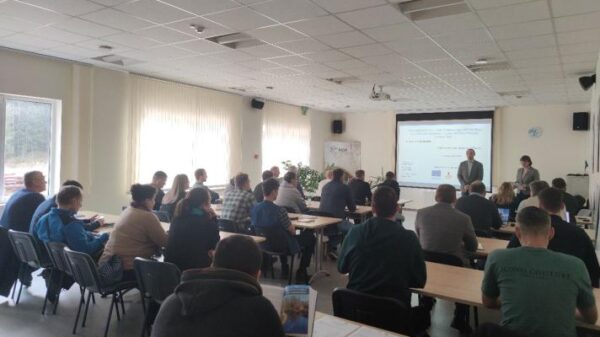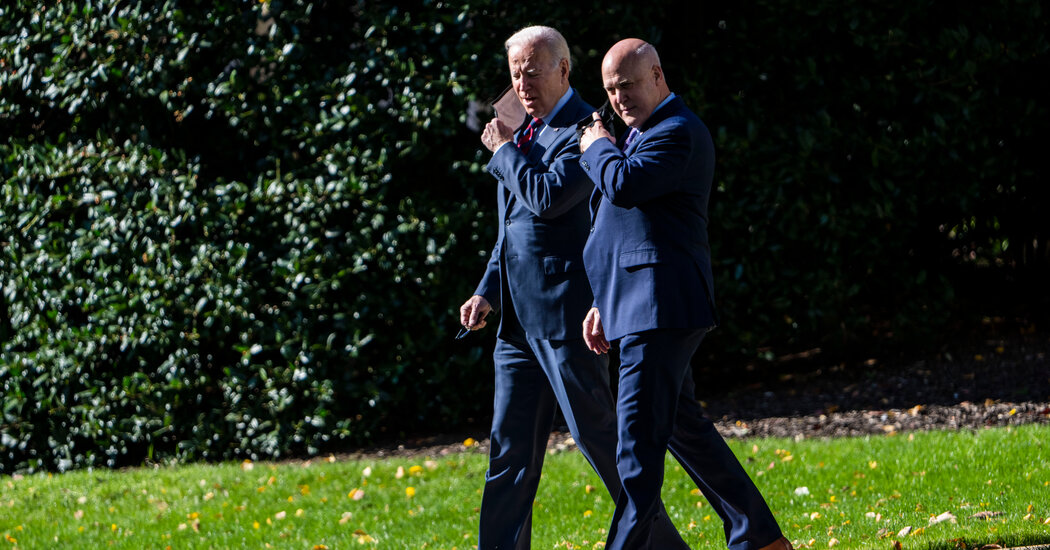Much of the funding is left up to state leaders, some of whom have already pushed back on the federal government’s goals. Mr. Landrieu will be key to resolving those differences.
WASHINGTON — At a rare formal news conference in January, President Biden hailed the $1 trillion infrastructure package that Democrats and Republicans had recently approved, promising that miles of roads would be rebuilt, railways and bridges would be upgraded, and America’s public transit system would become a source of international envy.
That same day, 16 Republican governors sent a letter to Mr. Biden that underscored the steep challenge he faces in turning his ambitions for the law into reality.
The governors pushed back on federal attempts, outlined in a memo, to encourage states to use the funds to repair roads instead of expanding them, which the Biden administration said would exacerbate auto emissions. The letter urged the administration to refrain from using the law to push its “social agenda,” which they said would impede their own goals for the package, and to give them “maximum regulatory flexibility” in spending the funds.
Mr. Biden is expected to promote the law and commit to repairing 65,000 miles of roads and 1,500 bridges in his State of the Union address on Tuesday. He has spent the past several weeks traveling around the country to sell the package, which is central to his broader agenda of reducing emissions, promoting racial equity, creating jobs and providing relief to disadvantaged households. But much of its success rests with state leaders, who get to decide how to use much of the funds and who may not always share the president’s goals.
At the center of that tension is Mitch Landrieu, the former New Orleans mayor who helped rebuild the city after Hurricane Katrina. As Mr. Biden’s infrastructure czar, Mr. Landrieu is responsible for ensuring that a signature piece of the president’s agenda is carried out along his terms.
He has engaged in an outreach campaign with state and local leaders in an attempt to fulfill Mr. Biden’s vision, talking with nearly every governor and more than 55 mayors and touring the country to promote the law. On Feb. 16, Mr. Landrieu met with a bipartisan group of senators to discuss their goals for the funding.
Some state leaders said their priorities aligned well with the federal government’s, such as repairing existing roadways, fixing decades-old bridges and expanding Amtrak service.
“Broadly speaking, the bill’s goals and our goals are the same,” said Gov. Ned Lamont of Connecticut, a Democrat. “It’s about upgrading antique infrastructure that’s key to economic development. It is about fairness and equity.”
But others, while accepting the money, have bristled at federal attempts to guide how it is spent.
Gov. Pete Ricketts of Nebraska, who signed the Jan. 19 letter, said states, particularly those outside the East Coast, needed the space to achieve their own priorities, such as constructing new highways. He also said the expansion of Amtrak service, a key goal of the Biden administration, was “not much of use” in Nebraska given its less dense population.
Mr. Landrieu called Mr. Ricketts in November to discuss how the two sides could coordinate efforts. While the governor said he appreciated the call, he is not optimistic that the Biden administration will give states the flexibility they need.
“Outreach doesn’t matter if you’re going to restrict us,” Mr. Ricketts said.
Republican lawmakers, several of whom voted with Democrats to pass the law, have sided with the states. Senators Mitch McConnell of Kentucky and Shelley Moore Capito of West Virginia wrote their own letter to governors telling them to ignore the administration’s memo, which they said had “no effect of law.” On Feb. 18, Mr. McConnell, Ms. Capito and 27 other Republican senators sent a letter to Transportation Secretary Pete Buttigieg criticizing the memo.
Mr. Landrieu, in an interview with The New York Times, said the letter from the governors did not surprise him. “There will always be a conflict in that zone,” he said about the tension between the federal government and states.
Resolving that conflict will be a delicate balancing act. He acknowledged that governors would “have the ultimate decision” and that some communities, such as those with fewer roads and bridges to repair, would need more flexibility.
“In those instances, it makes perfect sense for them to do that. In other states, it doesn’t.” Mr. Landrieu said. “There’s got to be flexibility in there, and we recognize that.”
But he made clear that the Biden administration would continue to try to influence the types of projects the funds went toward, including by issuing federal guidance and recommendations.
“The federal government does have the power to set what they call guidance and rules and regulations,” Mr. Landrieu said.
So far, some states have shown a willingness to defy — and challenge — those rules.
Gov. Doug Ducey of Arizona, a Republican whose state recently sued the Biden administration over efforts to recoup stimulus funds, said his office was not afraid to push back if he believed federal guidance was too overreaching. Mr. Ducey said widening highways was one of his top priorities for the rapidly growing state.
“We don’t need additional guidance from the federal government,” he said.
Most of the money has yet to flow, with just nearly $100 billion allocated to state and local governments and the bulk of funding expected to be released over the next two to three years.
That poses another challenge for Mr. Landrieu. It could be years before many of these projects are complete, making it harder for Mr. Biden to highlight the law’s impact in the midterm elections and ahead of his re-election campaign.
Mr. Landrieu said he had faced a similar dilemma while in office, pointing to the construction of the new Louis Armstrong New Orleans International Airport terminal. That $1 billion project, which he pushed and secured funding for, was completed after his tenure, although he was not up for re-election. Mr. Landrieu said that Mr. Biden would continue to promote the package, but that he did not think the president had to stand beside completed projects for Americans to understand his contribution.
“Getting credit is really not that important. I mean, what you’re doing here is something that’s going to last for generations, we hope,” Mr. Landrieu said. “So we want to go fast, but we want to get it right.”
Mr. Landrieu, who gained national recognition for removing four Confederate monuments in New Orleans, said he would also prioritize addressing racial inequities.
“I can’t offer anything to the African American community about their experience,” Mr. Landrieu said. “I can offer my view of being a white man from the South that grew up during one of the most difficult racial times and the way that white people here have a difficult time dealing with the issue of race in a way that allows us to recognize our past.”
His allies described him as a detail-oriented and effective leader who knew how to cut through federal bureaucracy. He built a reputation as the person who turned New Orleans around after it was run by C. Ray Nagin, who was later imprisoned for bribery and fraud. But he faced a mixed record over some of his infrastructure work, including his handling of the city’s Sewerage and Water Board. He was also known as an aggressive leader who pressed forward with his decisions, a style that rankled some of his critics.
The Infrastructure Bill at a Glance
The bill receives final approval. The House passed the $1 trillion bill on Nov. 5 to rebuild the country’s aging public works system. The proposal is a central plank of President Biden’s economic agenda, which he signed into law on Nov. 15. Here’s what’s inside the bill:
Some said Mr. Landrieu’s experience leading New Orleans made him equipped for his current job. The city, with its pothole-filled streets, century-old pipes and persistent flooding problems, embodies some of the nation’s most dire infrastructure deficiencies.
.
Cedric Richmond, one of Mr. Biden’s closest advisers and a former congressman who represented most of New Orleans for a decade, said Mr. Landrieu had a record of making tough decisions to “get stuff done,” pointing to the new airport terminal.
Paul Rainwater, who served as the interim executive director of the Sewerage and Water Board, said Mr. Landrieu “will not just take an answer.”
“He wants to know the how and the why,” Mr. Rainwater said.
Mr. Rainwater was responsible for turning the Sewerage and Water Board around after a severe thunderstorm overwhelmed the city’s pumping and drainage network, flooding hundreds of cars and properties. After the 2017 floods, Mr. Landrieu demanded the resignations of some agency officials, who initially claimed the system was working properly.
The situation prompted criticism from people like Aaron Mischler, the president of the New Orleans Fire Fighters Association, who said Mr. Landrieu had failed to improve the agency and oversee its leadership during his eight years in office.
“Those issues still remain,” he said.
Some who worked with Mr. Landrieu described him as an aggressive leader. Rosalind Cook, a co-president of the League of Women Voters of New Orleans, said the group had met with Mr. Landrieu during his second term as mayor to discuss moving the upcoming early winter election to the fall, when voters would be less distracted by the holidays and sporting events.
According to Ms. Cook, Mr. Landrieu adamantly opposed the proposal, which could have cut his tenure short, and said the change should wait.
“If he had a conflicting view, he was much more of a bully behind closed doors,” said Ms. Cook, a Tulane University political science instructor. The change was later made, but the inauguration date did not change, resulting in a longer transition.
Others said Mr. Landrieu’s strong personality was an asset.
“Sometimes people are not always thrilled with a leader moving as decisively as Mitch has been required to do over time,” said Walt Leger, a former Louisiana state representative. “But I’ve never seen that result in a negative for the community.”



























